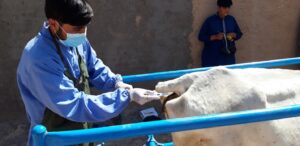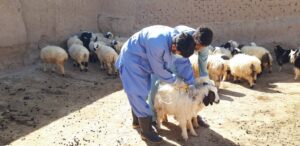Address:
- Street # 5 of Syloo, House # 152-153, District 3, Kabul, Afghanistan
- info.afg@dca-af.org
- Sun - Thu: 8.00 AM to 4.00 PM
My colleagues in Herat and I drove 121km from Herat City of Afghanistan to visit one of the recently graduated paravets that established a VFU in Barnavad village of Ghoryan District in Herat Province. The paravet named Hamidullah Abduljalil is a breadwinner of 7 family members including himself.
DCA, the district government, the provincial and district agriculture, irrigation and livestock departments, and customary leaders choose villages for which a person to be trained as a paravet was chosen based on the number of animals in the neighborhood and access to veterinary services. Barnavad village has more than 10,000 animals and there is no Veterinary Field Unit (VFU) close by which makes it an ideal location for establishing a new VFU.
“Nomination of candidates for paravet training has a number of criteria at the outset”, says Hamidullah. “The fascination, honesty and trust are the key for the customary leaders to pick the right person”. According to Hamidullah, there were 12 candidates selected by customary leaders in the village. Each of them took the entrance exam at the DCA training center in Herat but “I was the one who proceeded to the next level and attended the 6 months training”.

Figure 1 Hamidullah taking the temperature of a cow in the cattle crush, Barnavad village, Ghoryan District, Herat Province
After 6 months of training at DCA’s training center located in Herat, Hamidullah started to deliver veterinary and extension services to the communities in the village since mid-July 2023. “So far, I have been working with 149 household herders in 7 sub-villages and treated 497 different species of animals. “My clients are herders and kuchies (pastoralists). Contagious caprine pleuropneumonia (CCPP, goats), enterotoxemia (sheep and goats), internal and external parasites of cattle, sheep and goats are the main diseases I treated”. The herders are requesting the quality vaccines for sheep and goat pox, and enterotoxemia before the winter season commences.
As a trusted member of the communities, Hamidullah has the opportunity of his work being announced by the Religious Leaders on Friday prayers that attracted several customers. He also rides his motorbike to visit different villages to treat animals, advise the herders, and maintain the cold chain to preserve vaccines. In less than a month since the establishment of his VFU, he has earned AFN 5,000 as a profit due to sales of medicines and vaccines amounting to AFN 12,000.

Figure 2 Hamidullah administering peste des petits ruminants (PPR, goat plague) vaccine to the sheep and goats using automatic vaccinator, Barnavad village of Ghoryan District, Herat Province
With the funding of IFAD, DCA has trained 45 paravets in 2023 that provide fee-based veterinary services to the herders and pastoralists in 15 provinces of Afghanistan. More than 45,000 households benefit from the veterinary and extension services of these paravets per annum. The extension packages that target seasonal treatment and vaccination, gender integration, livestock and livestock products improvement, and hygiene benefit both the herders and the paravets given that productivity and income increase for the herders, and more customers visit the VFUs.

Leave A Comment